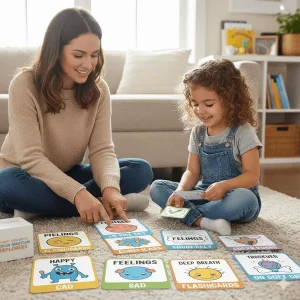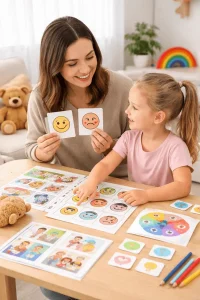Premarital Counseling Guide: Strengthen Your Bond
By Prapoorna M
Last Updated: April 5, 2024
Welcome to the beginning of a beautiful journey towards understanding premarital counseling. This guide will help you understand that while premarital counseling might seem complicated, it’s actually a really helpful step for couples planning to spend their lives together. At its core, premarital counseling is a proactive approach to ensure that your partnership has a strong foundation for the challenges and joys that lie ahead.
Why is this important, you may wonder? Think of your relationship as a tree. Just as a tree needs healthy soil to grow tall and strong, your relationship requires a solid base of understanding, communication, and mutual goals. Premarital counseling provides that fertile ground, helping couples to discuss and navigate through their expectations, fears, and dreams before saying “I do.”
Understanding Premarital Counseling
What Is Premarital Counseling?
Premarital counseling is a special class for couples planning to marry. It’s not like regular therapy that solves existing problems. Instead, it prepares you and your partner to be strong together. You’ll learn how to build a relationship that lasts through any challenge.
Also Read: Better ways to communicate in relationships
Who Needs Premarital Counseling?
There’s a common misconception that premarital counseling is only for couples who are experiencing problems. Let’s debunk that myth right now: premarital counseling is for every couple. Whether you’ve been together for six months or six years, whether you’re in the throes of passion or comfortably settled into your relationship, this type of counseling can enrich your partnership.
The truth is that every couple has something to gain from premarital counseling. It’s an opportunity to explore deeper aspects of your relationship in a safe and supportive environment.
The Benefits of Premarital Counseling
Premarital counseling is super important for two big reasons: it helps you and your partner grow closer and teaches you how to talk things out and solve problems together. These components are the bedrock of a resilient and loving relationship.
Strengthening Your Bond
At its core, premarital counseling serves as a conduit for deepening the connection between partners. It provides a space to explore and address common concerns that may not have surfaced in everyday conversations. By engaging in guided discussions about finances, family planning, career goals, and personal values, couples can align their expectations for the future, fostering a stronger, more unified bond.
Learning to Communicate and Resolve Conflicts
Premarital counseling is like building a strong relationship house. If making your bond strong is the base, then learning good talking and solving disagreements is what keeps everything standing. This counseling gives you great tools and tips for dealing with arguments and mix-ups that happen in all relationships.
It’s all about learning to share what you need, want, and worry about in a kind and caring way. You get to learn how to really listen, talk clearly and helpfully, and find middle ground. These skills are key to fixing problems calmly, making sure both of you feel heard and valued.
Key Topics Covered in Premarital Counseling
Embarking on the journey of premarital counseling opens up a dialogue on various significant topics, each designed to fortify your relationship and set you on a path to a harmonious future together. Here’s a look at some of the key areas most premarital counseling sessions will cover:
Finances:
Often considered one of the most common sources of conflict in a marriage, discussions on finances can include budgeting, debt management, saving strategies, and financial goals. Addressing these topics early can help couples establish a solid financial foundation and avoid potential stressors down the line.
Family Planning:
This involves conversations around the question of having children, parenting styles, expectations, and how to handle potential challenges. These discussions ensure that both partners have a mutual understanding and agreement on their vision for their family’s future.
Roles and Expectations:
Understanding each partner’s expectations concerning household responsibilities, career ambitions, and personal goals can prevent misunderstandings. It helps in negotiating and defining roles that suit both partners, contributing to a balanced and fulfilling relationship.
Communication and Conflict Resolution:
Learning effective communication techniques and strategies for resolving disagreements is crucial. This topic covers how to express needs and feelings constructively, listen actively, and reach compromises that respect both partners’ perspectives.
Intimacy and Physical Connection:
Exploring expectations around physical affection and sexual intimacy can enhance closeness and satisfaction within the relationship. It’s an opportunity to discuss desires, boundaries, and any concerns openly.
In-Laws and Extended Family Dynamics:
Navigating relationships with in-laws and extended family can be tricky. Premarital counseling can provide strategies for setting healthy boundaries, managing expectations, and fostering positive relations with family members.
Personal Space and Independence:
Maintaining a sense of self and independence is vital in a marriage. Discussions may revolve around how to support each other’s individual interests, friendships, and alone time, ensuring that both partners feel fulfilled and valued.
By addressing these key topics, premarital counseling lays the groundwork for a strong, resilient marriage.
Key Components of Premarital Counseling
| Component | Description | Importance |
|---|---|---|
| Communication Skills | Learning to express thoughts, feelings, and needs effectively. | Crucial for resolving conflicts and deepening emotional intimacy. |
| Conflict Resolution | Techniques for managing and resolving disagreements constructively. | Prevents conflicts from escalating and damaging the relationship. |
| Financial Planning | Discussions on budgeting, debt, savings, and financial goals. | Reduces stress and conflict related to money matters in marriage. |
| Family Planning | Conversations about the desire for children, parenting styles, and family goals. | Ensures alignment on future family dynamics and expectations. |
| Roles and Expectations | Clarification of each partner’s role in the household and marriage. | Prevents misunderstandings and unmet expectations. |
| Intimacy and Connection | Exploring emotional and physical intimacy needs. | Strengthens the bond and ensures both partners feel fulfilled. |
| Extended Family Dynamics | Navigating relationships with in-laws and extended family members. | Helps maintain harmony within the wider family context. |
Read more about: Marital Bliss: How to Make Your Marital Life Blissful?
What to Expect from Premarital Counseling Sessions
Understanding Premarital Counseling
Going through premarital counseling is a big step for couples. It’s about getting ready for your future together. Here’s a simple look at what you can expect:
The Journey Begins
- First Meeting: Your first session is about getting to know you both. You’ll talk about your relationship’s past, what’s great about it, any worries you have, and what you hope to get from counseling. You might fill out some questionnaires or just chat.
- Talking Things Through: In the next meetings, you’ll dive into big topics like how you talk to each other, handle disagreements, deal with money, and think about family. These chats help you understand each other better.
- Doing Activities Together: You’ll do some activities that help you work better as a team. This could be practicing how to talk about tough stuff, planning your finances, or learning how to support each other better.
- Getting Feedback: Your counselor will give you tips and thoughts on how you’re doing and how you can keep making your relationship stronger.
- Homework: Yes, there’s homework! But it’s fun stuff meant to help you grow closer. You might read articles, try out new ways to chat, or plan something special together.
Comparison of Counseling Formats
| Feature | Online Counseling | In-Person Counseling | Group Counseling | Private Counseling |
|---|---|---|---|---|
| Cost | Generally lower due to reduced overhead costs. | Higher, reflecting the cost of physical space and resources. | Lower costs are shared among participants. | Highest, due to personalized one-on-one attention. |
| Time Flexibility | High sessions can be scheduled more flexibly and attended from anywhere. | Moderate, dependent on both the couple’s and counselor’s availability and location. | Moderate to low, scheduled around group availability, less flexible. | Moderate, scheduled around both the counselor’s and the couple’s availability. |
| Personal Attention | High, though dependent on the quality of the online platform and internet connectivity. | Very high, with face-to-face interaction enhancing personal connection. | Lower, as the counselor’s attention is divided among several couples. | Very high, with personalized, focused attention on the couple’s specific needs. |
| Privacy | High, with sessions conducted in the privacy of your own home. | High, though attending a physical location may not feel as private to some. | Lower, as sessions are conducted with other couples present. | Very high, with private sessions ensuring confidentiality. |
| Accessibility | Very high, ideal for remote or busy couples. | Lower requires traveling to the counselor’s office. | Moderate, dependent on the location of group sessions. | Moderate, requires traveling to the counselor’s office but offers personalized scheduling. |
| Interaction Quality | Dependent on technology can be very high with stable internet. | Highest, benefits from direct, face-to-face communication. | Varied, can offer rich interactions through group dynamics but less personalized. | Highest, benefits from direct, one-on-one communication. |
Finding the Right Premarital Counselor
Picking a premarital counselor is like finding the right key for a lock. The best match can open up a new world of understanding and growth for your journey together. Here’s how to find a counselor who fits you both well:
- Talk About Your Needs: First, chat with your partner about what you want from counseling. Are there certain things you want to focus on? Any preferred styles? Knowing what you need helps you find the right expert.
- Check Their Skills: Look for someone with the right background in therapy, psychology, or social work. If you need help with things like talking better or managing money, find a counselor who knows a lot about those topics.
- Do You Feel Good Together?: It’s super important that you and your partner are comfortable with your counselor. Many offer a first meeting to see if you click. Since you’ll share personal stuff, feeling at ease is a must.
- Your Values Matter: If faith or culture is big for you, find a counselor who gets it. They don’t need to believe the same things, but they should respect and include your values in your sessions.
- Think About the Details: Look at where they are, when they’re available, and how much they charge. With online sessions now an option, you might find something that fits your life better.
- Listen to Your Gut: After meeting a counselor, think about how you felt. Were you comfortable? Did their way of doing things feel right to you? Your gut feeling is important in choosing the best person for you.
At Wellness Hub, we’re all about helping you find the tools and knowledge for a strong, happy relationship. Choosing the right premarital counselor is a big step toward a healthy marriage. This journey is a big promise to make each other happy, and picking the right counselor is your first step.
Making the Most of Your Premarital Counseling
Starting premarital counseling is a big step toward a strong future together. Here’s how to get the most out of it:
- Be Open and Honest: Share your true feelings, fears, and hopes openly in sessions. This is a safe place for both of you, to be honest.
- Listen Well: It’s key to not just hear your partner but really get what they’re saying. This makes you both feel closer and more understood.
- Being Open: It can be hard to share your fears and hear your partner’s, too, but it’s how you both learn and grow together.
- Do Your Homework: If you get tasks from your counselor, take them seriously. They help you use what you learn in your everyday life.
- Stay Open-minded: Be ready to try new ways of dealing with things in your relationship. Being flexible can really help.
- Enjoy the Journey: Improvements take time. Celebrate the little wins along the way and keep focusing on growing together.
Explore more on our article: Are You Still in Love With Each Other? | Never Neglect To Say It
Conclusion
Premarital counseling is more than preparation; it’s a profound step toward forging a deep, resilient bond between partners. It equips couples with the essential tools for communication, conflict resolution, and mutual understanding, ensuring a strong foundation for their future together. As we advocate for this meaningful journey, it becomes clear that engaging in premarital counseling is a wise, forward-thinking move for any couple looking to strengthen their relationship and build a lasting union.
In supporting couples on their path to a harmonious marriage, Wellness Hub offers a treasure trove of resources designed to complement the foundational benefits of premarital counseling. Our commitment is to provide continuous support and guidance, making Wellness Hub an invaluable ally in your relationship journey. By integrating premarital counseling with the wealth of knowledge and encouragement available through Wellness Hub, couples can look forward to a marriage that thrives on understanding, respect, and enduring love.
Frequently Asked Questions:
1. What Is Premarital Counseling?
Premarital counseling is a type of therapy for couples who are considering marriage. It helps partners get to know each other better, talk more clearly, and deal with small issues before they turn into big problems. It’s designed to strengthen the relationship and build a solid foundation for a healthy marriage.
2. Why Should Couples Consider Premarital Counseling?
Couples should consider premarital counseling to enhance their relationship, learn vital communication and conflict resolution skills, and address differences in a supportive environment. It’s a proactive step towards ensuring a strong, healthy, and lasting marriage.
3. How Long Does Premarital Counseling Last?
The duration of premarital counseling can vary based on the couple’s needs and the program or therapist’s approach. Typically, it might range from a few weeks to several months, with sessions often held weekly.
4. What Topics Are Covered in Premarital Counseling?
Key topics include communication, conflict resolution, finances, family planning, roles and expectations, intimacy, and extended family dynamics. These discussions aim to prepare couples for a harmonious future together.
5. Can Premarital Counseling Prevent Divorce?
While nothing can promise a marriage without any chance of divorce, premarital counseling really helps by giving couples the tools they need to face tough times and make their relationship stronger. Studies suggest that couples who undergo premarital counseling are better prepared to navigate marital difficulties.
6. How Do I Choose the Right Premarital Counselor?
Look for a counselor with credentials in marriage and family therapy, psychology, or social work, and one whose expertise and approach align with your goals and values. Consider factors like compatibility, logistics, and whether the counselor respects your beliefs and preferences.
7. What If My Partner Is Hesitant About Premarital Counseling?
Encourage open communication about the hesitancy. Discuss the benefits and the goal of strengthening your relationship. Knowing that counseling isn’t just for couples with problems, but for anyone looking to make their relationship stronger, can help people feel more comfortable with the idea.
8. Where Can I Find More Resources on Premarital Counseling?
Wellness Hub offers a wide range of articles, resources, and guidance on premarital counseling and other aspects of building a healthy relationship. Visit Wellness Hub for more information and support on your journey towards a fulfilling marriage.
9. Is Premarital Counseling Beneficial for Couples Who Already Have a Strong Relationship?
Yes, even couples with a strong relationship can get a lot out of premarital counseling. It’s a chance to dig into deeper parts of your relationship, talk about what’s ahead, and make sure you both have the skills to keep your bond strong as time goes on. It helps make a good relationship even better and gets you ready to face challenges together.
10. Can Online Premarital Counseling Be as Effective as In-Person Sessions?
Online premarital counseling can be just as effective as in-person sessions, offering flexibility, convenience, and a comfortable setting for couples to explore their relationship. Many find it easier to fit into their schedules and appreciate the privacy it offers. The effectiveness largely depends on the couple’s commitment to the process and the skill of the counselor facilitating the sessions.
About the Author:
Prapoorna Mangalampalli
M.Sc., M.A., (Dual Masters in Psychology & English) – Counselor (6+ years of experience)
Prapoorna armed with a passionate dedication fueled by dual Master’s degrees in Psychology and English, Prapoorna sheds light on and elevates human experiences. Over 6+ years of experience fuel her insightful approach to counseling, offering profound empathy and guidance across diverse areas like online, marital, relationship, child, family, and career counseling.
At Wellness Hub, she thrives in a team environment that values innovation, compassion, and achieving results for their clients.
Connect with Prapoorna to learn how she can help you or your loved one find their voice and build a brighter future.
Book your Free Consultation Today
Parent/Caregiver Info:
Client’s Details:
* Error Message









